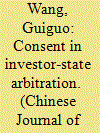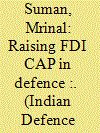| Srl | Item |
| 1 |
ID:
133975


|
|
|
|
|
| Publication |
2014.
|
| Summary/Abstract |
Consent is a precondition of arbitration, regardless of whether it is between private parties to commercial transactions or a foreign investor and its host State. Consent determines the formation and competence of arbitration tribunals. It is therefore a foundation of the investor-State arbitration system. By its very nature, privity is not required in investor-State arbitration, albeit consent is essential to prove that the tribunal in question is bestowed the power to arbitrate. In addition, consent to arbitration may be given by the host State and the foreign investor at different times. It is often the case that the host State will give consent first, which is regarded as a standing offer. The acceptance of this offer by the investor, and thus its own consent, may be accomplished by its filing of a request for arbitration or by direct notification to the respondent State. Due to the variety of treaties coupled with contracts between foreign investors and host States, whether or not a host State has given consent to arbitration and the scope of the consent is often at issue. As far as the form of consent is concerned, most arbitration rules do not stipulate what may constitute a valid consent. For instance, the Convention on the Settlement of Investment Disputes between States and Nationals of Other States ('ICSID Convention') requires consent to arbitration to be in writing. It does not, however, further provide the requirements of writing. In such circumstances, disputing parties have the freedom to choose the manner of expressing their consent. In the circumstances, investment arbitration tribunals are left with much discretion in determining whether consent has been given and its validity as well as its scope. Because of this situation, the decisions of investment arbitration tribunals sometimes trigger criticisms. This article is going to examine the most relevant cases for the purpose of ascertaining the current status of investment law in operation.
|
|
|
|
|
|
|
|
|
|
|
|
|
|
|
|
| 2 |
ID:
133036


|
|
|
|
|
| Publication |
2014.
|
| Summary/Abstract |
it is time makes up its mind whether it wants FDI in defence or not. If it is felt that FDI is not essential and India can archive technological excellence through indigenous efforts; it should be stated upfront and all pretenses of seeking FDI should be shed. The current apathetic and uninspiring approach is a meaningless charade. The recent increase in FDI cap to 49 percent is totally inconsequential and will not attract FDI. this fact has been amply established by joint studies carried out by the CII with KPMG and ASSOCHAM with Ernst and young. both studies indicate that foreign investors want a minimum of 51 per cent holding.
|
|
|
|
|
|
|
|
|
|
|
|
|
|
|
|
| 3 |
ID:
095545


|
|
|
|
|
| Publication |
2010.
|
| Summary/Abstract |
Since economic reforms began in 1979, China has sought to overcome the technology gap by absorbing foreign advanced technology through FDI. This paper investigates the impact of FDI via exports on the innovation performance of domestic firms in China's high-tech product industries for the period 1995-2006. By using the panel data analysis, we confirm the hypotheses that: (1) exports of domestic firms have positive spillover effects on innovation performance of local firms either through learning or through competition; (2) R&D activities of foreign-invested enterprises in the host country in an industry are positively associated with innovation performance of domestic firms in that industry; and (3) import of technology, which is important to the establishment of assimilative capability, has positive effects on domestic innovation performance. This provides evidence suggesting that China's domestic firms benefit from spillovers associated with FDI and from export activity of both domestic firms and foreign-invested enterprises.
|
|
|
|
|
|
|
|
|
|
|
|
|
|
|
|